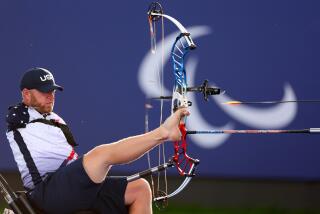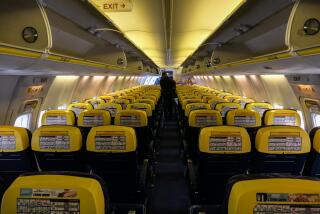He’s Conquering His Own Everest : Jerry Davila Succeeds Despite Polio
- Share via
Jerry Davila dreamed of climbing a mountain when he was a little boy growing up in Corinto, Nicaragua.
He didn’t get to the top of that mountain, but he’s climbing another now, and if he isn’t at the top, he can see it from where he is.
Davila, 28, a quadriplegic, is confined to a wheelchair.
He contracted polio when he was 9 months old, and 15 years later, in 1973, came to the United States for treatment of his paralysis. He has had surgery 18 times at Orthopaedic Hospital in Los Angeles.
Post-polio paralysis afflicts the muscles. It hits some people in the legs only. Davila isn’t one of those. All of his extremities are affected, but he has some use of his left hand and foot.
“I can’t walk at all,” he said. “When I was a little kid, they got me walking in braces. But then I went home and I couldn’t afford to buy new braces.
“I know what the feeling is like to walk. I’ve tried it. When I was younger, I used to say I wish I could walk. I wanted to climb a mountain.
“But I get along and I do OK just the way I am. I’ve accepted the reality of this. If I go someplace and there are stairs, I go with friends and they help me.
“Sometimes people help me too much, and I don’t like that. I don’t like to be rude or anything but I try to do as much as I can for myself.”
One of the things he does for himself is compete. For, despite his handicap, Davila is an athlete. In fact, he is an elite wheelchair athlete. He will participate in table tennis at the Pan American Wheelchair Games in Puerto Rico in November. He and his partner won the doubles title at the National Wheelchair Games last June in New York and he finished fourth in singles.
“Everything I’ve wanted to do, I’ve done it,” Davila said. “The feeling of winning is satisfaction.
“When I first started I couldn’t serve because I couldn’t hold the ball and paddle. I got good at it. When I was in high school I used to miss my lunch to play.”
His ultimate goal is to win a gold medal at the World Games for the Disabled.
“It’s amazing what he does,” said Les Hayes, the athletic director at Widney High in Los Angeles, a school for the physically disabled that Davila attended. “He’s an unbelievable athlete in his class. He’s one of the best athletes I’ve coached.”
Davila uses his left hand to serve, holding the paddle and ball. He moves slowly around the table, using his one good foot and his bad hand.
He practices at a table tennis center in Chinatown, where he has yet to win a match against any non-handicapped player.
He also plays basketball for the Rancho Raiders, a team at Rancho Los Amigos Hospital, where he’s an outpatient, and competes in track and field. He’s ranked first in the state among wheelchair athletes in the discus and club throw.
He also enters five-kilometer races, and he recently attended the National Wheelchair Games at the University of Illinois.
He’s at a disadvantage against most other wheelchair racers, however, because he has so little strength in his arms, which push the chair.
Still, Davila’s apartment is filled with the medals and trophies he has won since he began competing at Widney. There are 500 students attending the school who are bused in from all over Los Angeles. They range in age from 11 to 22.
Davila trains for as many as five hours a day. He pushes his chair at the USC track or at Widney. He has a part-time job as an adult counselor in Pasadena. He graduated from Los Angeles City College and would like to return to school to get a master’s degree in psychology.
Davila’s lives in a federally funded apartment complex for the disabled in Little Tokyo. There’s a two-year waiting list to get in. He has a full-time attendant at home to help him.
It’s expensive to compete. A competition racing wheelchair--a streamlined model with small front wheels--costs more than $1,800. Davila is using an old chair he bought for $700.
The beginning of Davila’s success in athletics coincided with a 60-pound weight loss. Davila, 5 feet 3 inches, said he weighed 160 pounds six years ago.
“I used to be a fat pig,” he said, showing before-and-after pictures of himself. “One day I just looked at myself in the mirror. I lost the weight in about 18 months. I didn’t do it fast. I have to watch what I eat eat. If I was still fat, I never could have gotten into a 12-inch chair (used for racing).
“And it’s a lot easier for the people who help me out to lift me out of my chair.”
More to Read
Sign up for Essential California
The most important California stories and recommendations in your inbox every morning.
You may occasionally receive promotional content from the Los Angeles Times.












